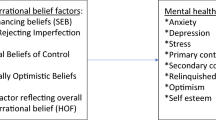Abstract
The psychological correlates of bulimia include affective disorder and emotional liability. In addition, emotional liability appears to precipitate binge-purge episodes. It has been proposed that emotional liability is a function of irrational beliefs regarding personal performance, interpersonal relationships and self-control. Irrational beliefs and bulimia symptoms were assessed with psychometrically valid self-report measures. Correlational analyses showed that the irrational beliefs of Anxious Overconcern, Problem Avoidance, Helplessness and Blame Proneness are separately correlated with bulimia symptoms. The implications for the psychological assessment and treatment of bulimia symptoms are discussed.
Similar content being viewed by others
References
Cook, M.L., & Peterson, C. (1986). Depressive irrationality.Cognitive Therapy and Research, 10, 293–298.
Cooper, P.J., & Fairburn, CG. (1986). The depressive symptoms of bulimia nervosa.British Journal of Psychiatry, 148, 268–274.
Cutts, T.F., & Barrios, B.A. (1986). Fear of weight gain among bulimic and non-disturbed females.Behavior Therapy, 17, 626–636.
Deffenbacher, J.L., Zwemer, W.A., Whisman, M.A., Hill, R.A., & Sloan, R.D. (1986). Irrational beliefs and anxiety.Cognitive Therapy and Research, 10, 281–292.
Ellis, A. (1962).Reason and emotion in psychotherapy. New York: Lyle Stuart Press.
Hart, K.J., & Ollendick, T.H. (1985). Prevalence of bulimia in working and university women.American Journal of Psychiatry, 142, 851–854.
Himle, D.P., Thyer, B.A., & Papsdorf, J.D. (1982). Relationships between irrational beliefs and anxiety.Cognitive Therapy and Research, 6, 219–223.
Himle, D.P., Hnat, S. Thyer, B., & Papsdorf, J. (1982, November). Paper presented at the 16th Annual Meeting of the Association for the Advancement of Behavior Therapy, Los Angeles.
Hinz, L.D., & Williamson, D.A. (1987). Bulimia and depression: A review of the affective variant hypothesis.Psychological Bulletin, 102, 150–158.
Jones, R.G. (1969).The Irrational Beliefs Test. Wichita, KS: Test Systems Incorporated.
Katzman, M.A., & Wolchik, S.A. (1984). Bulimia and binge eating in college women: A comparison of personality and behavioral characteristics.Journal of Consulting and Clinical Psychology, 52, 423–428.
Lee, N.F., Rush, A.J., & Mitchell, J.E. (1985). Bulimia and depression.Journal of Affective Disorders, 9, 231–238.
Lohr, J.M., & Bonge, D. (1980). Retest reliability of the Irrational Beliefs Test.Psychological Reports, 47, 1314.
Lohr, J.M., & Bonge, D. (1981). On the distinction between illogical and irrational beliefs and their relationship to anxiety.Psychological Reports, 48, 191–194.
Lohr, J.M., & Bonge, D. (1982). The factorial validity of the Irrational Beliefs Test: A psychometric investigation.Cognitive Therapy and Research, 6, 225–230.
Lohr, J.M., Bonge, D., & Jones, D. (1983). Social desirability and endorsement of irrational beliefs.Psychological Reports, 53, 395–397.
Lohr, J.M., Hamberger, L.K., & Bonge, D. (1988). The relationship of factorially validated measures of anger proneness and irrational beliefs.Motivation and Emotion, 12, 171–183.
Lohr, J.M., & Parkinson, D.L. (1986, August).Personality correlates and the measurement of bulimia symptoms. Paper presented at the 94th Annual Convention of the American Psychological Association, Washington, D.C.
McLaughlin-Mann, L., & Thelen, M. H. (1985, May).Subscales of the bulimia test: Differences between non-bulemic, borderline bulimic, and bulimic women. Paper presented at the 57th Annual Convention of the Mid-western Psychological Association, Chicago, IL.
Mizes, J.S. (1985). Bulimia: A review of its symptomatology and treatment.Advances in Behavior Research and Therapy, 7, 91–142.
Mizes, J.S. (1988). Personality characteristics of bulimic and non-eating disordered female controls: A cognitive behavioral perspective.International Journal of Eating Disorders, 7, 541–550.
Nelson, R.E. (1977). Irrational beliefs and depression.Journal of Consulting and Clinical Psychology, 45, 1190–1191.
Pope, H.C., & Hudson, J.I. (1985a). Biological treatments of eating disorders. In S.W. Emmett (Ed.),Theory, and treatment of anorexia nervosa and bulimia: Biomedical, sociocultural, and psychosocial perspectives (pp. 73–92). New York: Brunner/Mazel.
Hope, H.C., & Hudson, J.I. (1985b).New hope for binge eaters. New York: Harper & Row.
Pyle, R.L., Mitchell, J.E., Eckert, E., Halverson, P.A., Neuman, P.A., & Goff, G.M. (1983). The incidence of bulimia in freshman college students.International Journal of Eating Disorders, 2, 75–85.
Rohsenow, D.J., & Smith, R.E. (1982). Irrational beliefs as predictors of negative affective states.Motivation and Emotion, 6, 299–314.
Rosen, J.C., & Leitenberg, H. (1982). Bulimia nervosa: Treatment with exposure and response prevention.Behavior Therapy, 13, 117–124.
Ruderman, A.J. (1986). Bulimia and irrational beliefs.Behavior Research and Therapy, 24, 193–197.
Shorkey, C.T., & Whiteman, V.L. (1977). Development of the Rational Behavior Inventory: Initial validity and reliability.Education and Psychological Measurement, 37, 527–534.
Smith, M.C., & Thelen, M.H. (1984). Development and validation of a test for bulimia.Journal of Consulting and Clinical Psychology, 52, 863–872.
Strangler, R.S., & Printz, A.M. (1980). DSM-III. Psychiatric diagnosis in a university population.American Journal of Psychiatry, 137, 937–940.
Striegel-Moore, R.J., Silberstein, L.R., & Rodin, J. (1986). Toward an understanding of risk factors for bulimia.American Psychologist, 41, 246–263.
Williamson, D.A., Prather, R.C., Upton, L., Davis, C.J., Ruggerio, L., & Van Buren, D. (1987). Severity of bulimia: Relationship with depression and other psychopathology.International Journal of Eating Disorders, 6, 39–47.
Author information
Authors and Affiliations
Additional information
Jeffrey M. Lohr, Ph.D., is an Associate Professor of Psychology at the University of Arkansas. His research interests are in the assessment of irrational beliefs and their association with dysphoric motivational states.
Donna L. Parkinson, M.A., is a doctoral candidate in the Department of Psychology at the University of Arkansas. Her research interests are in the assessment of eating disorders.
Rights and permissions
About this article
Cite this article
Lohr, J.M., Parkinson, D.L. Irrational beliefs and bulimia symptoms. J Rational-Emot Cognitive-Behav Ther 7, 253–262 (1989). https://doi.org/10.1007/BF01073811
Issue Date:
DOI: https://doi.org/10.1007/BF01073811



